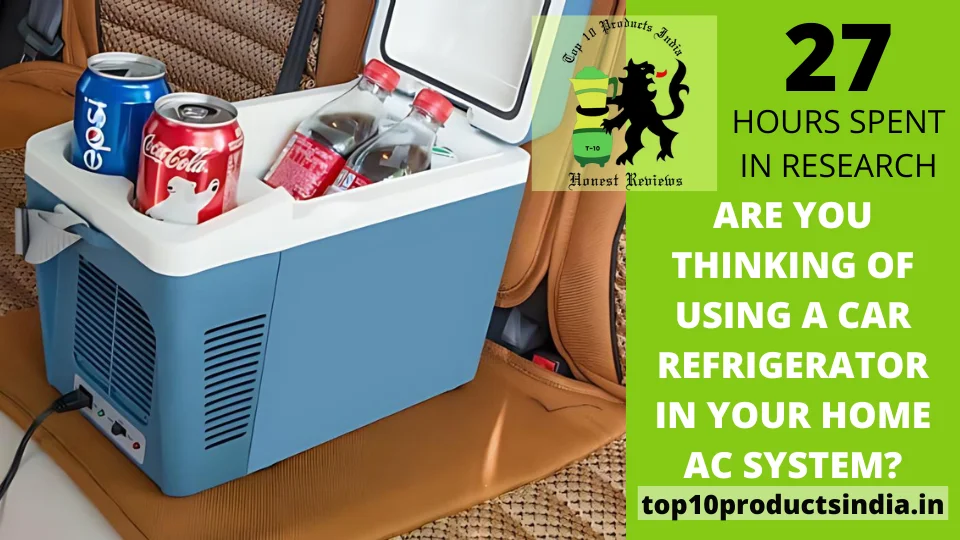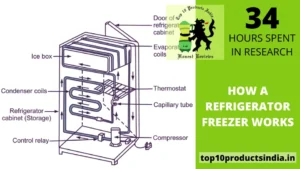Are you worried that there can be some potential risks and challenges associated with using your car refrigerator in your home AC? Well, it’s good that you are gaining some knowledge about it because let me tell you one thing: refrigerators like R134A aren’t designed to be used for home AC units.
In short, it will cause system damage and health hazards. Environmental harm is another disadvantage here. You will have to check a lot of things. For example, long-term costs, safety precautions, legal compliance, and compatibility should be considered before considering such a step.
HVAC professionals know a lot about this. So it’s better to converse with them about the same so that what you design doesn’t prove to be a blunder. You need to prioritize the use of refrigerators, which are specially designed for home AC units only.
Also, your disposal practices need to be environmentally friendly. Shall we read further?
Differences Between Car and Home AC Systems

Well, at first glance, you might find home AC units similar to car air conditioning systems, but let me tell you, they operate much differently.
In car AC systems, R134A refrigerant is used, whereas, in terms of the AC units that you deploy in your homes, R22 or R410A are used. Car systems, as you can already understand, are perfect for cooling smaller spaces, whereas home AC units are for cooling large areas.
Obviously, there is going to be a difference in the mechanisms and components of both of these. They are designed in different manners, and they function differently.
Compatibility Concerns: Can Car Refrigerant be Used in Home AC?
Well, if you are seeking a short answer, then let me tell you it’s not a good idea to use car refrigerant in your home AC system. As I said, it is typically R134A, which is not compatible with the requirements of home AC units.
Now you might think, what if I mix this gas with R22 or R410a? Well, you are risking potential safety hazards. Also, if you are doing something like that, warranties won’t cover it.
Yes, in most cases, no home AC unit manufacturer allows the user to use such fishy techniques, and this is clearly a violation of the regulations mentioned on the warranty cards. Consulting HVAC professionals can bring out some results, but again, I would say it’s still a fishy thing to do.
Potential Risks and Safety Considerations
- System damage: If you are using improper refrigeration, then you’re surely bringing in potential risks to the AC components, which will demand replacements or repairs in future.
- Health Hazards: If you are using refrigerant incorrectly, it may even release some exceptionally harmful chemicals in the air, which will definitely hurt your health.
- Fire hazard: If you’re mixing refrigerants, then it might even create explosive conditions or be flammable because, down the line, you don’t know the chemistry and composition of these refrigerants, right? You may end up setting your home on fire.
- Environmental impact: There are many refrigerants that badly impact ozone. This leads to global warming, and I’m sure you have studied about the same in your school. As discussed before, hardly any AC system manufacturer will provide you with warranties for such experiments. As what you are doing might bring possible damages, warranties don’t cover such fishy practices and the damage caused by that.
Legal Implications: Regulations on Refrigerant Use
- EPA regulation: The Environmental Protection Agency or EPA regulates the handling of refrigerants to ensure good public health and no harm to the environment.
- Phase out of ozone depletion substances: There are no deficiencies in countries that have actually banned ozone-depleting refrigerants such as R22. Also, a few countries have special guidelines for the disposal of such refrigerants.
- Licensing requirements: Each and every HVAC professional is supposed to have a certificate and a license to handle refrigerants. They need to have adequate knowledge related to safety and environmental standards.
- Penalties for non-compliance: Obviously, if you are breaking the rules, you are always eligible to pay the penalty. If you are violating refrigerant regulations and trying out things by yourself without knowing the regulations, then you need to be ready to pay extra fines.
Environmental Impact: Effects of Using Car Refrigerant at Home
Well, you can already expect this. If you are using car refrigerant in your home AC units, you are inviting environmental issues.
We have already discussed that the most common gas used in car refrigerants is R134A, which often causes greenhouse gases. This leads to global warming when you release it into the atmosphere. The GWP or the global warming potential of such gas is much higher than the gas you are using in your home AC unit.
In short, it traps the heat in the atmosphere and increases the level of carbon dioxide. Now, while you are trying to use such refrigerants in your home AC units, there is a chance that a bit of it will leak. You might not believe this, but even small leaks can bring unbelievably higher levels of harm to our environment.
Now, what if a system malfunction takes place? Can you even imagine how much harmful gas you will be releasing into your environment?
Besides that, improper disposal of old refrigerants is again very harmful to the environment. Now, if you want to mitigate these effects, just stick to the rules. Use refrigerants for the purpose for which they are developed. Don’t try to experiment with these things.
Alternatives to Car Refrigerant for Home AC Units
Fortunately, you’ve got a huge pack of alternative refrigerants available on the market that you can use conveniently for home AC units, bringing in less or no harm to the environment or yourself.
R410A is a great example. Nowadays, many households are actually using this low GWP gas in their home AC systems. Most importantly, it is ozone-friendly, which means it won’t lead to ozone depletion.
Another one is hydrofluoroolefins, HFOs, which are being developed to further reduce the environmental impact. You can consult with HVAC professionals who know a lot about these gases, as well as a few more.
So, they will be the best people to advise you perfectly. By using a perfect alternative refrigerant, you will ensure that you minimize the carbon footprint and being a good citizen, you can contribute to environmental sustainability.
Making Informed Decisions: Factors to Consider Before Using Car Refrigerant
- Compatibility: Your car refrigerant needs to be compatible with home AC units, as well as its requirements and specifications.
- Legal compliances: In many countries, as mentioned before, using specific car refrigerants in home AC units is not allowed. So check the environmental standards and local regulations before trying out anything by yourself.
- Safety precautions: Gas mixing can be hazardous, and it may even kill you without letting you know that you are actually causing harm to your health or even life. Some gases are slowly poisonous, and they kill you by attacking your neurosystems.
- Environmental impact: Yes, this thing was already taught to us in our schools. Refrigerant gas actually plays a big role in depleting the ozone layer.
- Manufacturer recommendations: Manufacturer’s guidelines speak a lot about what to do with your AC unit and what not. Only if it allows you to use your car refrigerant can you opt for this option.
- Professional knowledge: about these gases, their usage and their impact. So one small 5-10 minute discussion will solve your doubts.
- Long-term costs: Now, if everything meets the standards, everything is fine. You cannot directly do this task. You need to consider the long-term costs because, yes, it may cost you almost thrice to use car refrigerant in your home AC unit as it is not specifically designed for that.
- Alternative options: Now, if things don’t seem to be working out for you, it’s better to check out some alternative gases for your home AC units.
- Proper handling and disposal: Just using the refrigerant is not enough. You need to ensure that your way of disposing of these gases doesn’t cause any hazard to our environment.
- Overall impact: You need to evaluate the overall impact of using a car refrigerator on your home AC unit and also ensure personal safety at the very same time before deciding on this task.










